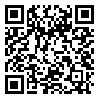BibTeX | RIS | EndNote | Medlars | ProCite | Reference Manager | RefWorks
Send citation to:
URL: http://pejouhesh.sbmu.ac.ir/article-1-1342-en.html

 , Masoome Alidosti
, Masoome Alidosti 
 , Ziba Raeisi Dehkordi
, Ziba Raeisi Dehkordi 
 , Mohhammad Jalil Saeli
, Mohhammad Jalil Saeli 
 , Mohamad Tagh Mahmoudi
, Mohamad Tagh Mahmoudi 

Background: Anemia is one of the most important issues in children's general health and among the most common type of anemia is iron deficiency anemia in this group. This study was performed with the aim to determine mothers behavior based on health belief model of using iron complementation in children 6 to 24 months in Shahrekord city.
Materials and methods: In this descriptive study, which was performed in 1391, 83 Mothers with children (6-24 months) were enrolled and completed the questionnaire designed based on health belief model. Validity and reliability of the questionnaire was confirmed in a pilot study (a=0.79). The data were analyzed by software SPSS-16, Spearman correlation test and Fisher test.
Results: Age of mothers was 28.95±4.05and 83% of mothers were housewives and high percentage (44.6%) had university education. Awareness, sensitivity and perceived severity of majority were and perceived benefits (59%) were good. However, the attitude of a considerable percentage (41%) towards removing the barriers (perceived barriers) was poor. Also, the performance of the 34.9 percent was poor. Between awareness, education and number of children, there was significant relationship (p<0.001) between performance and perceived barriers was significant inverse relationship (p<0.001, r =- 0.49).
Conclusion: It seems that attitudes of mothers toward remove of obstructs in given the iron drop to the child has been poor. Therefore, necessary to develop continuing education programs and effective in the field is felt. Keywords: Anemia, Iron drop, Health belief model.
Received: 2014/11/26 | Accepted: 2014/11/26 | Published: 2014/11/26
| Rights and permissions | |
 |
This work is licensed under a Creative Commons Attribution-NonCommercial 4.0 International License. |




